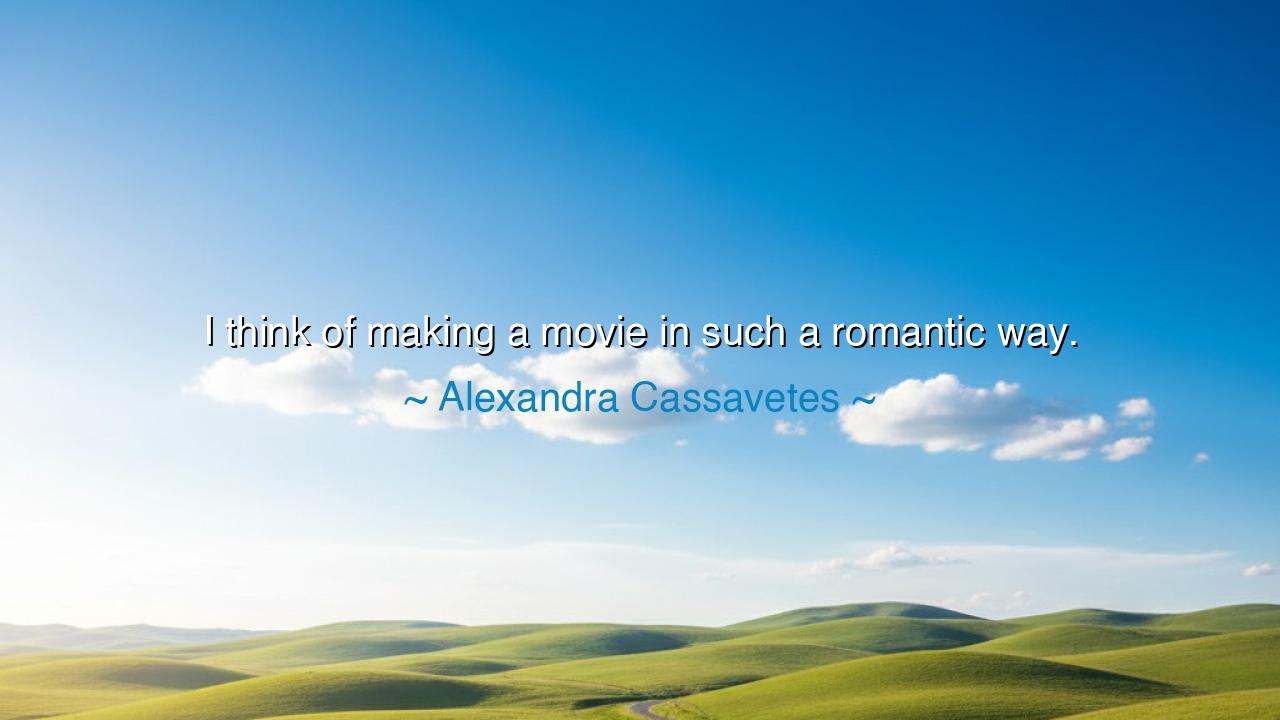
I think of making a movie in such a romantic way.






"I think of making a movie in such a romantic way." These words spoken by the visionary Alexandra Cassavetes echo through the corridors of time, reminding us of the deep, almost sacred bond between creation and romance. To make a film, to tell a story through images and sounds, is an act of the heart—an offering of one's soul to the world. A movie is not merely a sequence of frames and light; it is an emotional journey, a dance between the artist and their audience, where the very essence of being is revealed through every scene, every gesture. And so, Cassavetes speaks not of mere mechanics, but of a devotion—a passion, a romantic vision that guides her hand as she shapes the world on the screen.
In the ancient world, the romantic was not just an emotion; it was a way of being, a view of life that saw beauty and truth as entwined. The artist, whether in the form of a poet, a sculptor, or a storyteller, approached their craft with a heart filled with longing. The Greeks, whose culture gave birth to the theater, understood this deeply. Sophocles, Euripides, and Aeschylus did not merely write plays; they wrote with their hearts wide open, weaving tragedy and love into the very fabric of their words. So too, when Cassavetes speaks of making a movie in such a romantic way, she draws upon this ancient tradition—she calls upon the artist's heart, filled with both the joys and sorrows of life, to create something that transcends the screen.
A movie, in its truest form, is more than a story told; it is a living, breathing thing. When an artist approaches a film with romance in their soul, they infuse it with their own personal passion, their deepest fears, desires, and dreams. Cinema is no longer mere entertainment—it is an invitation to feel, to experience the world through the eyes of the creator. To make a movie romantically is to pour one's soul into it, much like a lover pours their heart into a letter. This connection between the creator and their work is akin to the relationship between the artist and the muse, where both the maker and the creation are engaged in a dialogue of profound, often ineffable depth.
Consider the legendary Federico Fellini, whose films were filled with rich, evocative imagery that danced between the surreal and the deeply emotional. Fellini viewed filmmaking as a romantic pursuit, where the boundary between reality and fantasy often blurred, and where every scene was an exploration of the human soul. His movie 8½ was not just a film; it was a meditation on the artist's inner world, filled with dreams, desires, and the struggle between creation and destruction. Like the ancient philosophers, Fellini's films were expressions of humanity at its most raw and vulnerable, a love letter to the messiness and beauty of life.
In every act of creation, there exists a romance between the creator and their work—a dance of love that is at once tender and turbulent. When Cassavetes speaks of making a movie romantically, she acknowledges that film is not simply about technique or the perfection of the craft. It is about pouring emotion into every frame, allowing each shot to pulse with the life of the creator. It is an intimate act, as personal as any love affair. Like a poet crafting verses or a sculptor chiseling away at marble, the filmmaker shapes and molds their creation, pouring the very essence of their being into it. To create a movie romantically is to embrace the vulnerability of this act—to give of oneself fully and without reservation.
Consider the Renaissance painters, who did not simply create works of art to adorn walls, but to express the depths of their soul. Leonardo da Vinci and Michelangelo were not just artists—they were visionaries who saw the world through the lens of romance. They poured their hearts into their creations, each stroke of their brush or chisel infused with a passion that transcended the act of creation itself. Da Vinci’s Mona Lisa is not merely a portrait; it is a study of the human condition, a romantic exploration of beauty, mystery, and longing. It is this romantic vision that Cassavetes speaks of—a vision that sees the world not just as it is, but as it could be, full of emotion, heartache, and beauty.
And so, in our own lives, we must take this lesson to heart. Every act of creation, whether it be in our work, our relationships, or our passions, deserves to be approached with the same romantic devotion that Cassavetes speaks of. Whether you are an artist, a teacher, a lover, or a leader, do not merely go through the motions. Do not let the world strip you of the romantic vision that sees beauty in the everyday, that believes in the possibility of love and magic in the mundane. Create with your whole heart, pour yourself into your work, and approach each day with the same passion and devotion that the artist feels in front of their canvas.
Let your life be your masterpiece. Approach it with the romantic vision that Alexandra Cassavetes speaks of, and you will find that the act of living itself becomes an art—one that touches not just the soul of the creator, but of all who encounter it. Let each moment be infused with the kind of love and passion that makes a work of art endure through time. In this, you will find the deepest fulfillment, and the world will be richer for the beauty you create.






AAdministratorAdministrator
Welcome, honored guests. Please leave a comment, we will respond soon